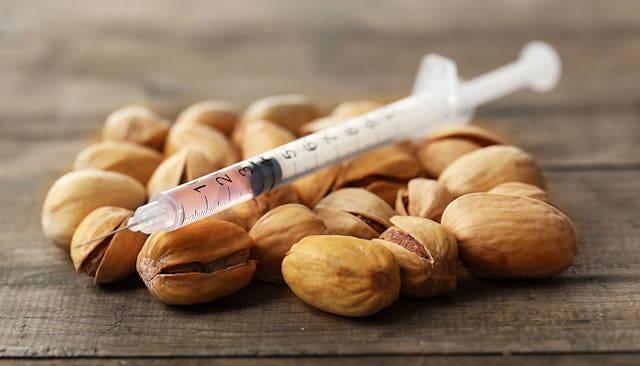Don't Be A Jerk About Food Allergies. It's Literally Life Or Death For Some Children.

My daughter has problems eating wheat. Nothing life-threatening, but the effects are clear enough that she’s avoided it for years now. With the gluten-free food craze, that’s gotten easier, but it’s still an inconvenience. We check ingredients and ask restaurants how things are made, and we spend more than we’d like to for wheat-free alternatives at home.
Dealing with a food intolerance is annoying enough. I can’t imagine what it must be like for parents of kids with life-threatening food allergies.
And I really don’t understand why some people turn into complete jerks when asked to help provide an allergen-free environment for vulnerable kids.
To me, this is a no-brainer. If a child is confined to a wheelchair, I’d expect a community to make adjustments to help that child participate in the community as fully as possible. If a child has developmental delays, I’d expect a community to educate other kids about his or her needs and do what they can to provide a safe and inclusive atmosphere for that child. If a child has a food allergy that could result in their death, a neighborhood or school community should do what they can to accommodate that child.
Is it fair to ask other people to sacrifice something so that a kid can be safe? Yes. It’s called community. When people in our community have a special need, we do what we can to help them, even if that means being a little inconvenienced.
No child’s desire for a peanut butter sandwich trumps another child’s life. If a PB&J is the only thing your child will eat at lunch, that’s absolutely no equivalent to an actual medical condition that could result in another child’s death. Period.
And in the case of food allergies, we really can be talking about life or death scenarios. I’ve seen some people say that it’s ridiculous that their child should have to go without peanut butter just because one kid in the class is allergic. Granted, deaths from food allergy is rare (186 to 225 deaths per year, approximately). But hospitalizations are much more common. My child’s lunch shouldn’t be a hospitalization risk for someone else’s child — not if we are aware and can make choices to lessen that risk.
I’ve also seen people say that a kid with a food allergy is going to have to learn to monitor themselves, and that the real world is not allergen-free. That’s true, but it’s also unrealistic to expect a kindergartner or first-grader to be constantly on guard. What about the kid who eats his peanut butter crackers, doesn’t wash their hands, and touches the communal crayon bin? What about the kid who absentmindedly wipes their fingers on the underside of their chair, which then gets picked up by an allergic kid?
Yes, these dangers exist out in the world, and it’s scary as hell for parents of kids with deadly allergies. Why would we not do what we can to at least make school or other community environments as safe as possible for these kids? Why not lessen their risk factors if it’s within our ability to do so?
It saddens me to think that some people are so focused on their own kids’ comfort or happiness that they are willing to risk another kid’s health — or life — over it. What does that teach our children? How does that help build supportive, helpful communities?
If your kid’s school or community gathering places request that people avoid peanuts, tree nuts, or other high-risk allergens and you find yourself feeling annoyed or defensive, take a deep breath. Take a minute to put yourself in another parent’s shoes. Take the opportunity to practice kindness and empathy. Set a good example for your children.
Dealing with serious food allergies is hard enough for parents and kids affected by them. Let’s be thoughtful and helpful community members for these families.
This article was originally published on